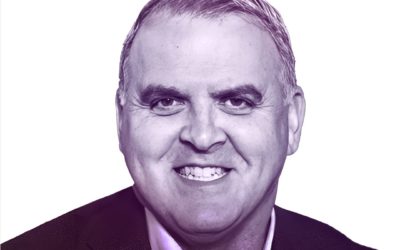This is the time to start building those relationships.”
Sid Vaidya
is a commercial banking professional who has spent the last 15 years in the banking world in financial institutions. Before that, he was an underwriter on the risk and financial analysis side and a second generation business owner. He has the operator experience as well as the advisory experience.
Get ahead of the difficult financial conversations
Anthony DeGraw: I appreciate that. I like that you have the dual focus or experience in both the business owner side of it and then the commercial lending banking side of it as well. Well, what we really wanted to talk about too is how right now are financial institutions helping their business clients during this time?
Sid Vaidya: Of course, we’re in this pandemic mode. I’ll give you a simple example is something the institution I’m working for, just one of the things that we’re doing is when a customer saying, “Hey look, I own a multiple batch of real estate properties and my rent is not coming in, can you help us?” We’re giving them, we wouldn’t call it forgiveness, but we’re really pushing their payments out in the back of the loan or something like that to give them that two to three months of a recovery time really, because naturally if your tenants aren’t paying you, how are you going to be able to afford to pay your mortgage.
Anthony DeGraw: That’s really good stuff. What do business owners need to know to get through a time like this? What are things that they may have not been considering prior to this? Because we’re on a, let’s call it, a 12-year run and times were good. What are the things that now, that times aren’t as great and they’re struggling, what do they need to know to get through times like this and what should they be preparing for after this is over.
Sid Vaidya: If you’ve applied for the PPP program, let’s say, and your lenders telling you that it’s going to take six to eight weeks to get the money, then if you have to, instead of firing a batch of people or furloughing them, just reduce salaries for a period of time and tell them that, “Hey listen, as long as we can hit our numbers and I can keep your house mortgage paid and things like that.” Talk to your employees, ask them. Especially the smaller, call it a 10 to 25 people operation, those are the ones where you can say, “Hey, Johnny, come in my room. I got to just talk to you briefly. Look, I can’t pay you, call it 2000 a month, but I might be able to pay you 1700. Does that cover your bills?”
Another thing that I’m telling people is start calling. If you’re using, call it, your phone service, your internet service, whatever, start calling these companies and ask them, “Hey listen, I got to keep my businesses more or less essential or we need to keep running. Can you help me?” A lot of people think that, “Oh, they’re not going to even help me.” The fact is, I’m telling my own customers that, “Thank God you called me. Because yeah, we have a program.” Naturally, I’m not going to go ahead and call thousands of people myself and say, “Hey, come here. I’m going to help you,” but you as a business owner have to take the time and start calling outbound.
Do you have your dream team?
Anthony DeGraw: When businesses are coming to you, what are the things they’re usually lacking? What are the things they could improve on?
Sid Vaidya: “Get your advisory team together.”
I could tell you the differences is when I go and talk to them and I say, “Hey, so what’s your EBITDA, earnings before interest, taxes, depreciation?” They say, “I’m not really sure what that means, Sid. Why don’t you call my CPA?” That right there, that single word, “Why don’t you call my CPA?” Then I say, “Oh, who’s your CPA?” Now all of a sudden that person built credibility. For a banking person, we look at three things when we lend money, that’s at least from what I’ve done, cashflow, collateral and character. Those are my top three Cs, cashflow, collateral and character. That credibility falls in the character. When somebody says, “Hey, call my CPA,” or “Hey, you know what? My attorney will get back to you because he has the documentation you need.” Now that shows that this person really has a dream team behind him or her.
Anthony DeGraw: That’s really good. There’s a term that we call and at first I thought it was only in the technology space and I’ve been trying to get it out there more and more because I think more organizations could use it, but we call it operational maturity level, OML. To your exact point right there, highly operational mature businesses, when you ask them that question, number one is the CEO, they should know the answer. But number two, at least they know where to get it.
What can I do to prepare for next time?
Anthony DeGraw: Exactly. Now in times not like this, so six months, nine months that this is over, we’re back to somewhat normal or what the new normal may be, what are different capital avenues? What are different potential products maybe or relationships with the banks or financial institutions that you should be thinking about developing so that you’re not caught off-guard next time, or that though you have in a emergency situation for your business, for whatever the reason may be? What are those things that people should be considering?
Sid Vaidya: When we’re ready to get out of it, you need to start developing for, frankly, this is the time just building those relationships. Call your banker, call whoever your lender is, if it’s not a bank or whatever. Talk to them, say what’s going on. Let them know that, “Hey, look, you know what? I may need it down the line, this or that or whatever.” I’d start teeing things up because the worst thing you can do is once, they call it, the floodgates open up and everything starts getting normal. Those people are going to get busy and if you weren’t there on the top of their mind, you’re not going to be there at the bottom either. It just won’t be.
Sid Vaidya: So, right now the people that are calling me are the people that are having struggling issues right now and we are giving them short-term capital. We’re helping them out or we’re telling them, “Hey listen, it just might be better you do X, Y, Z things.” But I know that those are people that when the economy starts boosting back up, they’re going to call me and I’m going to, frankly speaking, I’m going to reach out and say, “Hey Mr. John, or Hey, Mr. Bob, or Ms. Sally, what’s going on? How are things turned around?”
now you should be building your dream team and then after this period is over, you should be really formalizing and building on that dream team by building on those people that you’ve start leaning on.
Lastly, is when you’re ready to … Let’s say somebody says, “All right, you know what? Economy’s now back up, we’re going to now start ordering products and things like that.” Reach out and start really figuring out that are these products and services and things that they’re getting back to normalcy with, is the end user there? Because you know what’s going to happen, there’s going to be huge bottleneck. During that bottleneck you’re thinking, “Oh man, I got to go order 3000 products.” Your competition’s also ordering 3000 products. So, you might actually not need as many upfront than you think you do. Yes, you always want to take care of your customers but you don’t want to over order either because then you’re going to be tight on cash flow. Right?
Planning is definitely a big aspect of, as things start improving, this is the time to start planning.


